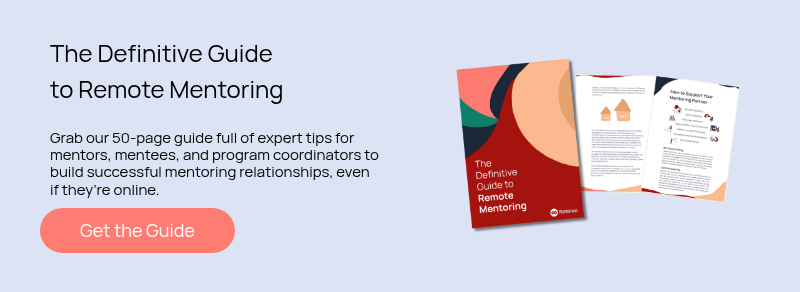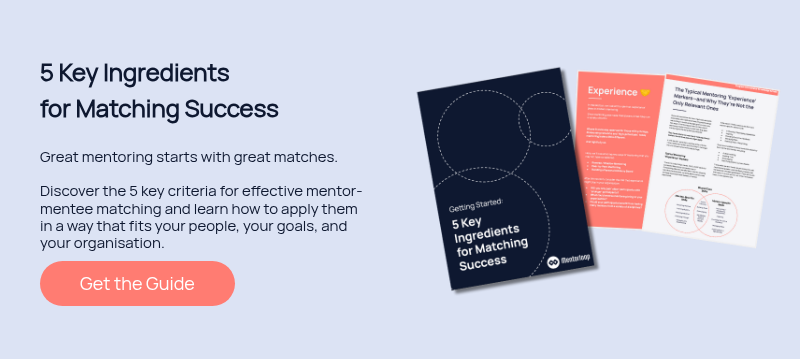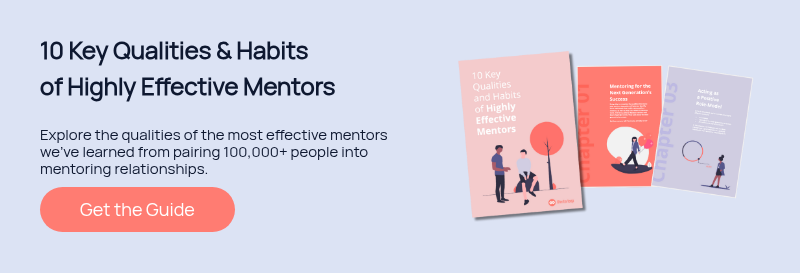Mentoring has long been a cornerstone of professional development. For years, it has been about finding a protégé to the older and wiser (and usually, white and male). For many, this simply meant finding someone that looks like themselves.
And this is backed by research. The Center for Talent Innovation, a New York-based non-profit that advises companies on diversity, has discovered 71% of mentors say that their chosen mentees are the same race and gender as they are.
When mentors are found picking only mentees who look and think like them, this cultivates a culture of mentoring where only more of the same kind of people are likely to grow and thrive in a company.
Thankfully, we believe this is the mentoring of the past. Hello, wonderful future!
However, the hangover of this style of mentoring still impacts the way we lift and support one another among organisations.
Understanding the 'Mini-Me' Syndrome
So what’s really happening here?
The “mini-me syndrome” is the unconscious instinct to favour those who remind us of ourselves. This, in turn, makes the individual more inclined to believe in their potential.
When this notion creeps into organisational mentoring, even those companies who claim they have reached a desired diversity of people are more likely to see a gap in inclusion actually expand.
This means the same voices get louder to the detriment of anyone else who doesn’t fit a certain mold.
The impact is very real, stirring up the typical diversity and inclusion issues that we’re all familiar with: the same kinds of people are presented with the same opportunities, nurtured into the same roles and cultivate the same higher-developed skills, ultimately leaving others behind.
Without a variety of voices and perspectives, those in leadership overlook the specific needs of their teams, and make it tough for those in a minority demographic or social group to speak up and voice their concerns.
It’s not a secret that numerous studies tell us that diversity alone doesn’t drive inclusion.
When a variety of voices and perspectives are in play, this provides organisations with the feedback to then go on to make better, more informed decisions. Programs and initiatives can be formed to lift cohorts up that need it most – and even design better, mentoring programs.
Without ensuring our mentoring programs address this from the beginning, it can compromise an employee’s authenticity. What does that look like? It might mean, “acting like one of the boys” for example.
Research on women in STEM industries shows that this type of inauthentic behaviour can often provide an advantage in becoming a leader in these fields, so it continues. However, it also diminishes morale.
The Consequences of Homogeneous, Mini-Me Mentoring
When organizations rely too heavily on “mini-me” mentoring, they unintentionally create ripple effects that can stifle growth, innovation, and inclusion. Here’s what you’re risking:
- Echo chambers: When mentors consistently pass down knowledge, opportunities, and insights only to people who mirror their own experiences, it limits exposure to new ideas. Over time, this creates echo chambers where the same perspectives are repeated and reinforced, ultimately stifling innovation. Diverse teams thrive on differences in thinking styles, lived experiences, and approaches to problem-solving. Without that variety, creativity takes a hit, and progress can stall.
- Stalled diversity efforts: Even the most well-intentioned diversity and inclusion strategies can falter if mentoring is only available to a select few. If underrepresented employees aren’t being mentored, they miss out on critical guidance, sponsorship, and opportunities to progress. That’s a big deal! Mentoring is often the bridge to leadership, and if that bridge is only available to some, your leadership pipeline won’t reflect the full diversity of your workforce.
- Employee disengagement: When employees look up and don’t see anyone like themselves in leadership or feel that development opportunities are reserved for a certain “type,” they can very quickly disengage. It sends a subtle but powerful message: “You don’t belong here.” This sense of exclusion doesn’t just impact morale; it can also lead to increased attrition, particularly among early- to mid-career professionals who are still shaping their career paths.
Mini-me mentoring may feel comfortable and familiar but it’s holding organizations back. Creating space for more inclusive mentoring relationships isn’t just the right thing to do, it’s a strategic move for any organization looking to thrive in today’s diverse, dynamic world.
So what do we do? Enter: inclusive mentoring!
To counteract the pitfalls of “mini-me” mentoring, organizations can go by the old, ‘actions speak louder than words’ saying. Demonstrate commitment and lead by example.
85% of employers consider improved diversity and inclusion a high priority, but 45% have no diversity strategy. So, don’t be one of them. Implement programs within your organization that communicate to your people, beyond words, that everyone’s development is important. Here’s how:
Make mentoring more accessible
Start by removing the barriers that make mentoring feel exclusive or out of reach. Instead of only offering mentorship to top performers or those handpicked by leadership, open the door to everyone. Self-nomination, opt-in programs, and open calls for participation help signal that growth opportunities aren’t reserved for a select few—they’re for everyone.
Inclusive mentoring communicates that development is a shared value, not a selective privilege.
Take advantage of different mentoring formats
Broaden your approach by embracing a mix of mentoring models:
- Reverse mentoring: Junior employees mentor senior staff, helping to challenge hierarchies and foster empathy.
- Peer mentoring: Colleagues at similar career stages support each other through shared experiences.
- Group mentoring: One mentor with multiple mentees (or vice versa) promotes collaboration and networking.
- Remote or virtual mentoring: Makes mentorship accessible across locations and schedules.
- Flash mentoring: Short, focused sessions for quick learning and exposure.
Different formats open up more paths for connection, learning, and inclusion—making mentoring work for a wider range of people and needs.
Inclusive mentoring communicates that development is a shared value, not a selective privilege.
Use data-driven matching
Smart matching matters. Instead of relying on gut feel or surface-level similarities, use data and structured inputs such as career goals, skills, interests, and development areas to match mentors and mentees. This helps move mentoring beyond comfort zones and into growth zones.
Data-driven matching leads to more diverse and impactful mentoring relationships by focusing on complementarity, not sameness.
Mentor your mentors
If you want mentors to support others effectively and inclusively, they need support too. Provide mentors with training on inclusive leadership, active listening, bias awareness, and how to mentor across lines of difference.
Mentoring is a skill. And like any skill, it gets better with guidance and practice. Empowering mentors makes for better mentee experiences, more authentic relationships, and a stronger mentoring culture overall.
Encourage building Personal Advisory Boards
One mentor is great, but a network of mentors is even better. Encourage employees to build their own Personal Advisory Boards: a mix of mentors they can turn to for different types of support.
This approach allows people to draw on diverse perspectives and advice, rather than relying on a single viewpoint. It also reflects the real, dynamic nature of career development today.
Final Thoughts
It’s time to move away from the outdated model of Mini-Me mentoring that reinforces sameness and limits opportunity. While it may feel familiar or comfortable, this approach holds organizations back from realizing the full potential of their people.
By embracing inclusive mentoring, you’re not just avoiding the pitfalls of exclusivity, you’re actively building something better. You’re unlocking:
- Enhanced innovation: Exposure to a variety of perspectives fuels creativity and smarter problem-solving.
- Higher employee engagement and retention: When people feel seen, supported, and valued, they’re more likely to stay and contribute at their best.
- More equitable development opportunities: Everyone, regardless of background, gets a fair shot at growth, leadership, and success.
- A stronger, more diverse leadership pipeline: When mentoring is inclusive, leadership starts to reflect the diversity of the workforce.
- A culture of belonging and progress: Inclusive mentoring sends a powerful message that growth isn’t reserved for a few—it’s embedded into your culture and accessible to all.
Let’s leave “mini-me” mentoring in the past and move toward a more modern, meaningful model that celebrates difference, nurtures potential, and drives progress.
Want to see what inclusive mentoring could look like in your organization?
Book a demo today and take the next step toward building a mentoring culture that works for everyone.







